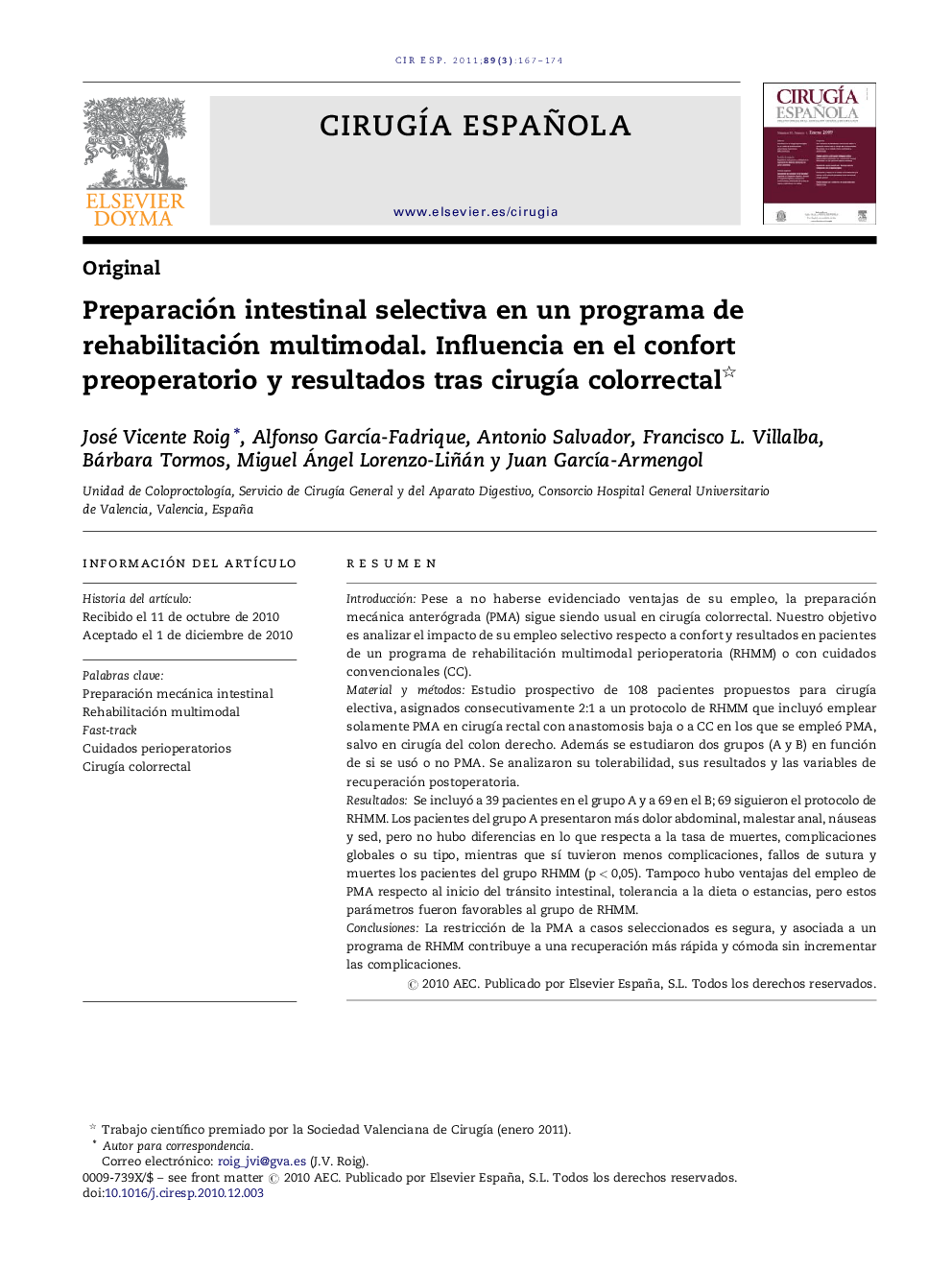| Article ID | Journal | Published Year | Pages | File Type |
|---|---|---|---|---|
| 4253468 | Cirugía Española | 2011 | 8 Pages |
ResumenIntroducciónPese a no haberse evidenciado ventajas de su empleo, la preparación mecánica anterógrada (PMA) sigue siendo usual en cirugía colorrectal. Nuestro objetivo es analizar el impacto de su empleo selectivo respecto a confort y resultados en pacientes de un programa de rehabilitación multimodal perioperatoria (RHMM) o con cuidados convencionales (CC).Material y métodosEstudio prospectivo de 108 pacientes propuestos para cirugía electiva, asignados consecutivamente 2:1 a un protocolo de RHMM que incluyó emplear solamente PMA en cirugía rectal con anastomosis baja o a CC en los que se empleó PMA, salvo en cirugía del colon derecho. Además se estudiaron dos grupos (A y B) en función de si se usó o no PMA. Se analizaron su tolerabilidad, sus resultados y las variables de recuperación postoperatoria.ResultadosSe incluyó a 39 pacientes en el grupo A y a 69 en el B; 69 siguieron el protocolo de RHMM. Los pacientes del grupo A presentaron más dolor abdominal, malestar anal, náuseas y sed, pero no hubo diferencias en lo que respecta a la tasa de muertes, complicaciones globales o su tipo, mientras que sí tuvieron menos complicaciones, fallos de sutura y muertes los pacientes del grupo RHMM (p < 0,05). Tampoco hubo ventajas del empleo de PMA respecto al inicio del tránsito intestinal, tolerancia a la dieta o estancias, pero estos parámetros fueron favorables al grupo de RHMM.ConclusionesLa restricción de la PMA a casos seleccionados es segura, y asociada a un programa de RHMM contribuye a una recuperación más rápida y cómoda sin incrementar las complicaciones.
IntroductionDespite there being no evidence of the advantages of its use, mechanical bowel preparation (MBP) continues to be routine in colorectal surgery. Our objective is to analyse the impact of its selective use, as regards patient comfort and results, comparing a perioperative multimodal rehabilitation program (MMRH) with conventional care (CC).Material and methodsA prospective study of 108 patients proposed for elective surgery, assigned consecutively 2:1 to an MMRH protocol which only included MBP in rectal surgery with low anastomosis, or to CC in whom MBP was used except in right colon surgery. We also studied two Groups (A and B) with and without the use of MBP. Their tolerance, results and postoperative recovery variables were analysed.ResultsThirty-nine patients were included in Group A, and 69 in Group B. A MMRH protocol was used in another 69 patients. The Group A patients had more abdominal pain, anal discomfort, nausea and thirst, but there were no differences as regards, death, overall or local complications, whilst there was less complications, suture failures and death in the MMRH when compared with CC Group (P < .05). There were no advantages observed in the use of MBP as regards the start of bowel movements, tolerance to diet or hospital stay, but these parameters were favourable to the MMRH when compared with CC Group.ConclusionsThe restriction of MBP is safe, and associated with an MMRH program, contributes to a faster and more comfortable recovery, without increasing complications.
